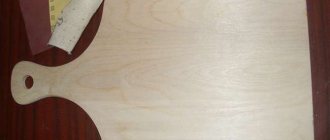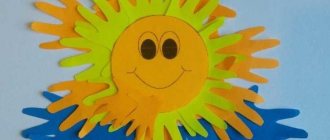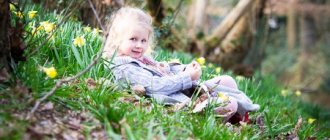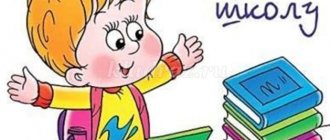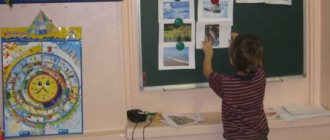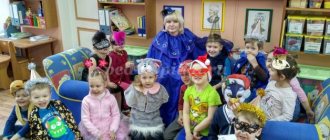Complex classes in the preparatory group of preschool educational institutions
Educator: - Hear, someone is knocking on the door. What do we do? Is it possible to open the door right away, most likely it’s mom who came? Why? (children's answers). Child:- If you stayed at home,
- And there was a knock on the apartment,
- The doorbell rang-
- Don't open it for anything
- You can't let strangers into the house.
- It’s better right away, so you know,
- Call mom and dad.
Educator: - When you are home alone, do not open the door for anyone, even if the person behind it says that your parents sent him. Children are invited to listen to an excerpt from S. Ya. Marshak’s poem “Fire”. Educator: - What should you do if a fire occurs? Children: - If something catches fire in the house, quickly leave or run out of the room or apartment, tell adults about it and ask them to call “01”, say that there is a fire in your house, and be sure to give your address; call mom at work. - If there is a lot of smoke in the apartment, bend low and move towards the door, covering your nose and mouth with a wet towel or scarf. - You can’t hide in far corners, under beds, closets - not only fire is dangerous, but also smoke. Practical task: “Report a fire by phone” (Children imitate calling the fire department). Child:
- You can’t handle a fire yourself, This is not work for children. Without wasting time, call “01” quickly. Dial skillfully, so that not everything burns! (L. Zilberg)
The crow Karkusha is flying: - Kar! Kar! Kar, guys! Hello! Have you met my friends here by any chance? (At this time, two children are quarreling, taking the ball from each other) - Oh, there you are! Guys, meet my friends. Opasik: - My name is Opasik! I warn all the guys about the danger! Safe: - My name is Safe, and I love to play! Karkusha: - So why are you quarreling? Security: - Because Opasik is a greedy person! Opasik: - The security guy chooses the wrong items to play with! Educator: - Guys, let's help friends make peace and divide all the points of dispute into those that are safe for play and those that are dangerous. Game: “Dangerous - Safe” (Children are divided into two teams. The first team collects safe items in the Safety basket. The second team collects dangerous items in the Opasika basket. The team that fills its basket correctly and quickly wins.) After the baskets will be filled, the results are summed up. Children explain how the following items can be dangerous: scissors, dishwashing detergent, tablets, nails, matches, knitting needles, beads, vitamins. Educator:
- To distant villages, cities Who is walking on the wires? Light Majesty - This is... electricity.
- I run along the paths, I can’t live without paths. Where am I, guys, there’s no light in the house? (Electricity).
Educator: -Can we live without electricity? (No). Right. Electricity is available in every home. This is our very first assistant. When it gets dark, we just need to click the switch button and the room is illuminated by the bright light of the lamp. Current runs through wires and makes electrical appliances work. And there are a lot of them in our house. For example:
- There is a window in the houses that is a little unusual. Whoever appears in the window will say a word to the whole country. (TV).
- The steamer goes back and forth. And behind him there is such a smooth surface, Not a wrinkle can be seen. (Iron).
- He is alone in the whole world. Very glad to meet dust. (Vacuum cleaner).
- On the table, in a cap, and in a glass bottle, a friend settled - a cheerful light. (Desk lamp)
- Only me, only I am in charge in the kitchen. No matter how hard you work without me, you will go without lunch. (Plate)
- I'm pot-bellied and puffing, I'm beautiful and shiny, If I just want to, I'll boil some boiling water. (Samovar, electric kettle)
Educator: - Let’s imagine that electricity stops flowing to your house, what will happen? (Children express their guesses). This means that we can conclude that electric current is our friend and comrade. Child:
- The current runs through the wires, It brings light into our apartment, So that the devices work: Refrigerator, monitors, Coffee grinder, vacuum cleaner - The current brings energy!
Child:
- Everyone knows that we cannot live a day without fire! In the fire, as in the sun - it’s light! It’s warm in the fire and in winter! But when we are careless with fire, it becomes our enemy.
Educator: - What rules of caution should we know and follow? Children name the rules and, together with the teacher, summarize the answers. - Remember! Never touch switched on electrical appliances with wet hands! Water passes current through itself. — Do not use water near switched on electrical appliances. Do not water flowers hanging above TV and other electrical appliances. — Do not use the outlet yourself; ask adults to turn on or turn off the electrical appliance. — Do not touch switched-on electrical appliances with metal objects (screwdrivers, scissors). — Do not touch the electrical wire. — When leaving home, check whether electrical appliances and the gas stove are turned off. Drawing signs “This is dangerous! Be careful!" Children are asked to come up with a prohibitory sign for their home, draw it, and then explain what is prohibited.
MAGAZINE Preschooler.RF
Teacher of category II Esipova Natalya NikolaevnaComplex lesson for children of the preparatory group (open final lesson for parents) Program content: create conditions for activity, independence, manifestation of a subjective position in cognitive activity; identify the level of children’s knowledge in the sections: mathematics, cognitive activity, literacy, based on the criteria for the level of children’s development in these sections.
Materials: travelers map, numbers from one to ten, chips, two magnetic boards, 10 magnets for each team, ball, steering wheel; - for each team of children:
• mathematics: large geometric shapes (circle, square, triangle), plot pictures for composing problems, sheets with segments, 8 triangles each, two rulers, a pencil, a pen, trays for handouts, numbers from one to ten, sheets with a picture for making figures from triangles; • literacy: one word for a sound pattern, one set of syllables to make a word, one set of words to make a sentence; • cognitive activity: cards with questions on surrounding ideas (see appendix to the lesson). - for each team of parents: • mathematics: sheets in a cage, pen; • literacy: a set of letters; • cognitive activity card with questions about the surrounding reality (see appendix to the lesson)
Lesson structure. Introductory part. Children enter the group. Educator: Children, let's say hello to the guests who came to travel with us. Guys, where can you travel? (children offer different guesses). Educator: Guys, what countries do you know? (children list) What is the name of our country? (children's answer) And if you dream, a kindergarten can be considered a country? Let's give this country a name. (bring the children to the name “country of preschool children”). And every country has different cities. Then we can say that in our country “Country of Preschool Children” there are three wonderful cities: Soschitaika - the city of mathematics, Chitaika - the city of literacy, Poznavaika - the city in which we learn a lot and learn to live in friendship with the outside world. Today I invite you to show our guests these cities that will lead us to what country do you think? (lead to the answer - “Country of first-graders”). Our parents will also travel with us and will help us on our journey. Educator: But in order to get to the country of first-graders, you need to be attentive, smart, smart, friendly, and correctly complete many different obstacles. Aren't you scared? And so we set off. And this map will help us with this.
Main part. 1 part. Mathematics. An announcement is read on the tape recording: “Bus number 9 is leaving for the city of Soschitaika. You can get on this bus with tickets, but only in pairs, the numbers on the tickets must add up to the number 9.” (children should split up in pairs and bring the numbers in pairs that make up the number 9). Our bus needs to find a driver, he will be the one who tells me a number consisting of one ten and five units (children's answers, the one who named first sits in the driver's seat). We also need a conductor; he will be the one who tells me the number of two tens and three units (children’s answer). Dear conductor, please check the passengers' tickets. (children take their seats on the “bus”) Educator: And while you and I are driving to the city of Soschitaika, we’ll play the game “Name the Neighbors” (with a ball) We’ve arrived. Look at the two tables and the geometric shapes on them. How are they different from each other? (bring to the division into teams) (there are different tasks on geometric figures) Educator: Now guess the task, which geometric figure are we going to do now?
Circle. Picture problems. It is necessary not only to solve the problem correctly, but also to be able to tell it. Highlighting its components (condition, question, solution, answer) Logical problems. (two problems for each team) (Riddle about the square) Square. Measuring and comparing numbers. It is necessary to connect two points using a ruler and measure the resulting segment and the existing segment and compare the numbers using the greater than, less than, equal signs. (riddle about a triangle) Triangle. Game with triangles. Look carefully at the drawing and make it up. (children are given a chip for completing tasks correctly)
What a great fellow you are, you have completed all the tasks proposed by the city of Soschitaika, you can send it to the next city, where we will fly on a cloud. And while you are resting on this cloud, your parents will also complete tasks. 1 task – logic puzzles. Task 2 – graphic dictation.
Part 2. Certificate. On the tables for both teams, different tasks are offered based on the material covered in literacy (three tables for each team and one common table). Children complete the task on the first table and move to the next table; when the tasks are completed, the children, together with the teacher, check whether the tasks were completed correctly. For correct execution, the team receives a token. Then the teams come to the common table and complete the task: “Make a proposal according to the scheme”; in this task you can make more sentences and collect more chips. First task: Make a sound diagram of the word. Team 1 – the word “book”. Team 2 – the word “sounds”. Second task: Compose a word from syllables and add stress. 1st command – the word “peek-a-boo”. Team 2 – the word “ma-shin-ka”. Third task: Make a sentence out of words. Children must form a sentence correctly (each child holds one word, and they are built from left to right, facing their parents). When the sentence is constructed, you can suggest constructing a sentence by swapping words. Team 1 – sentence “Warm summer will come soon.” Team 2 – sentence “The first flowers bloom in spring.” Common table: four sheets of sound diagrams. Both teams approach the tables at the same time and make sentences at speed. The teacher sums up the results of the literacy game. Then the children are asked to sit on chairs and listen to how their parents answer.
Assignments for parents “Make a word.” (there are letters on the tables in front of the parents, parents are asked questions, they must choose the correct letter, and from 5 letters make up the word “School”) 1. The first consonant sound, which begins the name of a large-horned animal, which provides a useful product from which you can make an omelet . (Cow) 2. The second vowel is the sound of the hard surface on which we walk. (PoL) 3. The vowel sound with which the name of the science that studies the structure of man begins. (Anatomy) 4. The first vowel sound of the name of a flower that is undressed by the wind. (Dandelion) 5. The first or last consonant sound of a forest house built from branches, where there is a sweet paradise. (ShalaSh) Summing up the results of this competition. Educator: To get to the city of Poznavaika, you need to solve a riddle. (riddle about a book)
Part 3. Cognitive block. Each team answers questions within 1 minute. For each correct answer, the team receives one chip. The game is played with parents using the same principle.
Final part. Summarizing. Educator: So we have reached the country of First-Graders. And here is your first bell, it welcomes you. I’m glad that you and I were able to reach this country with good results, and I think that in this country you will only study at……..(children finish). You see, dear parents, your children promise to study only for four and five, and I think you will help them with this.
Questions for children. 1. Tea vessel? (kettle) 2. Where does rain come from? (cloud) 3. Model of the globe? (globe) 4. Who builds dams on the river? (beaver) 5. What do you open in the morning when you go to wash? (crane) 6. Name the largest sea animal? (whale) 7. Where does a camel live? (desert) 8. What do fish breathe? (gills) 9. What are people who fish called? (fisherman) 10. An insect that looks like a helicopter? (dragonfly) 11. A house floating on water? (ship) 12. What is the name of the city where you live? (Berezniki) 13. Bird house? (nest) 14. Why does the water in the river heat up? (sun) 15. Who flies the plane? (pilot) 16. Is the fox a wild animal or a domestic animal? (wild) 17. The longest-nosed boy? (Pinocchio) 18. Where does the river flow? (sea) 19. Name the first cosmonaut? (Gagarin) 20. Who has a hump on his back? (camel) 21. What are the balloons filled with? (by air) 22. Is a tree always green? (spruce) 23. What is the name of the huge flash of electricity sparkling between the clouds? (lightning) 24. What does a cactus have instead of leaves? (thorns) 25. What does a bear do in winter? (sleeping) 26. Glass house for fish? (aquarium) 27. Name the coldest time of the year? (winter) 28. Who has needles on his back? (hedgehog) 29. What does a car eat? (gasoline) 30. What is another name for a pig's nose? (nickel) 31. What does a drop turn into when heated? (pars) 32. What is the name of the game in which they play with a stick and a puck? (hockey) 33. Who is the mouse afraid of? (cat) 34. What day is it today? (…) 35. Where does the polar bear live? (north) 36. What does water turn into when it freezes? (ice) 37. What do we hear? (ear) 38. How does a fox cover its tracks? (tail) 39. When is it hot outside? (in summer) 40. Name the baby of the sheep? (lamb) 41. What can you use to cross the river? (boat) 42. What number does the counting start with? (one) 43. Who is called the king of beasts? (lion) 44. What color is the water? (colorless) 45. Who has a house in a hollow? (squirrel) 46. What is the name of the president of our country? (Putin) 47. A device for cleaning dust in the house? (vacuum cleaner) 48. Which bird stands on one leg? (heron) 49. What does the wind drive across the sea? (wave) 50. What do moms call their dad? (grandfather) 51. Who has a trunk instead of a nose? (elephant) 52. What remains on the asphalt after rain? (puddle) 53. What are teeth for? (chew) 54. What animal likes to howl at the moon? (wolf) 55. How do you wash off soap? (with water) 56. Who wears the dress? (girl) 57. Who has long ears? (hare) 58. Name the car with horns? (trolleybus) 59. What bird can be taught to speak? (parrot) 60. Name the predator. (…) 61. How can you draw? (pencil,..) 62. Why does tea become sweet? (sugar) 63. An insect that looks like a flower? (butterfly) 64. Where can you swim in winter? (swimming pool) 65. Does a snake have paws? (no) 66. What grows upside down in winter? (icicle) 67. Which animal has the longest neck? (giraffe) 68. Who works underwater? (diver) 69. Predatory sea animal? (shark) 70. What does our country call it? (Russia)
Questions for parents. 1. Small sea in the house? (bath) 2. A device with which a person breathes under water? (scuba gear) 3. A stream of water gushing from underground? (fountain) 4. How do fish reproduce? (caviar) 5. Does a polar bear swim? (yes) 6. Name the highest mountain on the planet? (Everest) 7. Earth satellite? (moon) 8. What is the name of a huge piece of ice in the ocean? (Iceberg) 9. What is a camel’s hump filled with? (fat) 10. The coldest continent on the planet? (Antarctica) 11. The layer of air surrounding the earth? (atmosphere) 12. The capital of Mexico? (Mexico City) 13. Where is it colder in the mountains at the top or at the bottom? (at the top) 14. Which animal changes its color? (chameleon) 15. Is a penguin a bird or an animal (bird) 16. A measure of time? (…) 17. Which animal is the tallest? (giraffe) 18. The most sour fruit? (lemon) 19. Last month of the year? (December) 20. Which dissolves faster in cold water: salt or sugar? (salt) 21. According to the children, who is the fattest writer? (Tolstoy) 22. What is pochepops? (Chupa Chups)
23. The capital of our country? (Moscow) 24. Is watermelon a fruit or a vegetable? (berry) 25. What animal sleeps upside down all its life? (bat) 26. Is iris a flower or a candy? (flower) 27. Is the ruff a bird? (fish) 28. Is night a part of the day or a season? (part of the day) 29. Where is it more convenient for a hare to run: from the mountain or up the mountain? (uphill) 30. Author of the work “Eugene Onegin”? (Pushkin) 31. Finish the proverb “It’s good when visiting...” (but at home it’s better) 32. The snowy granddaughter of Santa Claus? (Snow Maiden) 33. Dust collector? (vacuum cleaner) 34. What is the first month of the year? (January) 35. Which insect lays its eggs on water? (dragonfly) 36. Who is your husband’s mother? (mother-in-law) 37. What is your zodiac sign? (…) 38. What day is April 1st called? (April Fool's Day) 39. A device that keeps liquid hot? (stove) 40. The place where the baby kangaroo sits? (pocket) 41. Children's doctor? (pediatrician) 42. A device that helps study the sky and stars? (telescope) 43. Does a wooden spoon sink? (yes) 44. What kind of water is in the sea? (salty) 45. “The children are talking.” 46. What is the name of the street, which, according to the children, is named after the scientist who breaks noses? (Lomonosov) 47. What does fart mean? (bought)
| Next > |
